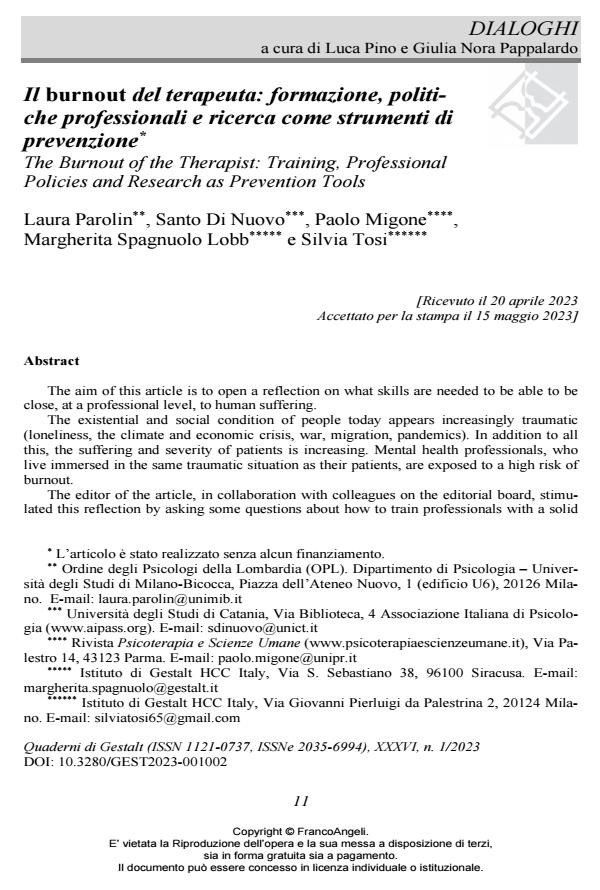The Burnout of the Therapist: Training, Professional Policies and Research as Prevention Tools
Journal title QUADERNI DI GESTALT
Author/s Laura Parolin, Santo Di Nuovo, Paolo Migone, Margherita Spagnuolo Lobb, Silvia Tosi
Publishing Year 2023 Issue 2023/1
Language Italian Pages 17 P. 11-27 File size 218 KB
DOI 10.3280/GEST2023-001002
DOI is like a bar code for intellectual property: to have more infomation
click here
Below, you can see the article first page
If you want to buy this article in PDF format, you can do it, following the instructions to buy download credits

FrancoAngeli is member of Publishers International Linking Association, Inc (PILA), a not-for-profit association which run the CrossRef service enabling links to and from online scholarly content.
The aim of this article is to open a reflection on what skills are needed to be able to be close, at a professional level, to human suffering. The existential and social condition of people today appears increasingly traumatic (loneli-ness, the climate and economic crisis, war, migration, pandemics). In addition to all this, the suffering and severity of patients is increasing. Mental health professionals, who live im-mersed in the same traumatic situation as their patients, are exposed to a high risk of burnout. The editor of the article, in collaboration with colleagues on the editorial board, stimulated this reflection by asking some questions about how to train professionals with a solid ground; which specific skills has a psychotherapy training have to support in order to accompany pa-tients through suffering. We are witnessing a fragmentation of psychological skills through the proposal of brief courses for professionals with expertise in very specific areas, but often without the basis of a broader training in the therapeutic relationship. We wonder what the role of research can be, how it can help us to orient our practices and training courses, This article is also intended to be a support for a possible dialogue between the various educational, cultural, and professional policy agencies so that there can be a creative adjust-ment between the new needs and the guarantee of adequate training. The authors interviewed, all important exponents of our profession working in significant and strategic contexts such as the Council of Psychologists, the University, research, training in psychotherapy, and psychotherapy journals, gave their contribution from their point of view, helping us to find coordinates within this complexity.
Keywords: Burnout, psychological suffering, psychotherapy, relationships, research.
Laura Parolin, Santo Di Nuovo, Paolo Migone, Margherita Spagnuolo Lobb, Silvia Tosi, Il burnout del terapeuta: formazione, politiche professionali e ricerca come strumenti di prevenzione in "QUADERNI DI GESTALT" 1/2023, pp 11-27, DOI: 10.3280/GEST2023-001002